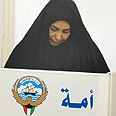
Kuwait’s elections fail to excite
Low turnout expected due to voter apathy in weekend balloting. Former MP: We are boycotting this election because it is not democratic
In the Gulf States, there is a special custom associated with the Muslim holy month of Ramadan. Called Gergean, it is similar to Halloween in the United States. Children, many of whom are fasting as is the custom during Ramadan, go door-to-door during the evening hours collecting candy from their neighbors.
The joke making the rounds in Kuwait these days says, “If you have a choice between participating in Gergean and voting in the election, go for Gergean because that only comes once a year, and elections come more frequently.”
Related stories:
- Kuwaiti imam: Cyber jihad effective
- Kuwait drops flotilla suit against Israel
- Kuwait hangs 3 men convicted of murder
It’s a sign of the lack of excitement surrounding the parliamentary elections that will be held on Saturday. It comes after the Constitutional Court dissolved parliament and annulled the results of the last election, held in December 2012.
That election, too, was an early election after the National Assembly, which was elected in February of that year, was also dissolved.
What is increasing voter apathy in this small Gulf nation is the court’s confirmation of a law that reduces the number of candidates each voter could select, from four to one. Opposition groups say that will allow the government to manipulate the elections.
“We are boycotting this election because it is not democratic,” Osama Al-Shaheen, a lawyer and former member of parliament told The Media Line. “The election system is being controlled by the government, not by parliament as it should be.”
'Timing is lousy'
Kuwaiti analysts say that allowing people to choose only one candidate for their districts to the National Assembly instead of the previous four limits people’s choice. Many choose their first candidate on the basis of family or tribal ties. If each voter can choose four candidates, it is more likely that opposition candidates will make up more of the 50 members of the National Assembly.
“If he is my cousin or from my tribe, I have to vote for him,” Ibrahim Al- Hadban, a professor of political science at Kuwait University told The Media Line.
Kuwait is a majority Sunni country, with a Shiite minority of between 20 and 25%. Women only received the right to vote in 2005. The total population is 2.7 million people, but 1.3 million of them are foreign nationals, and cannot vote. The government announced earlier this year that it wanted the foreign worker population to decrease by 100,000 each year.
Kuwait is a parliamentary constitutional monarchy headed by Emir Sabah al-Ahmad al-Jabir Al Sabah, who has been in power since 2006. The Sabah family has governed Kuwait since the 18th Century. Parliament must approve the emir’s appointment, and the emir can then appoint the prime minister.
Opposition groups say the parliament, rather than the emir, should choose the prime minister. In the past few elections, voter turnout was only around 40%. Al-Hadban says that getting people to the polls is important for Kuwait.
“It is important for the government to get people back to participating in elections,” he said. “The current parliament only lasted five months. This is a second chance for the government and the opposition to push people to participate, but the opposition has decided to boycott the elections.”
However, he says, it’s unlikely that participation will be much higher. First of all, temperatures are hovering around 125 degrees Fahrenheit, making it difficult for people to get out during the day. In addition, many people travel during Ramadan and will not be present to vote.
“The timing is lousy and people are fasting,” he said. “I don’t think anyone will come home from Asia or Europe just to vote.”
Nevertheless, there are important issues on the table. Earlier this month, Kuwait announced it will provide $4 billion in aid to Egypt, following the overthrow of Egyptian President Mohamed Morsi. The package will include a $2 billion central bank deposit, a $1 billion grant, and $1 billion in oil products.
Some in Kuwait say that money should stay in the country and be used to improve the country’s health and educational services.
Kuwait’s oil revenues have made it one of the richest countries in the world, and enabled it to give services such as free college education to all citizens. The oil wealth may also be one of the reasons that the turmoil that has rocked many of the neighboring Arab countries has skipped Kuwait.
Yet, many analysts agree that if voter turnout remains low, the government will eventually lose its legitimacy.
Article by Linda Gradstein
Reprinted with permission from The Media Line
- Receive Ynetnews updates directly to your desktop










